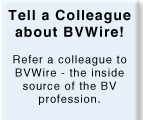Appraisers decry the devaluation of 409A work
We received a flurry of responses to the item on 409A valuations in the most recent BVWire™ (“CFOs don’t value appraisals done for 409A compliance”). Not surprisingly, they all warned against the many risks of valuing cost over quality work:
- “409A valuations are not ‘in danger of becoming commoditized to the lowest cost providers,’" writes Jeffrey Tarbell (Houlihan Lokey). “That happened years ago. Until we see a few high profile cases in which companies or CFO's get penalized by the IRS—and we might soon—CFO's will continue to direct this business to largely unqualified ‘chop shops.’ The fees those firms charge indicate either: (1) they pay their staff in peanuts, or (2) they don't put any meaningful time into the analysis.”
- “It is ironic that the 409A rule was part of the American Jobs Creation Act—yet most of the work is done overseas,” writes Shiva Badruswamy (AccuServe U.S., Inc.), who’s covered the topic on his blog. Most valuators, vendors—and CFOs—do not realize that 409A engagements must satisfy an evidentiary requirement, he says. To help change this perception, appraisers “can only keep educating clients about the uselessness of doing valuations that don't meet basic U.S. evidentiary standards.”
- Client resistance may remain high (and prices low) so long as 409A regulations continue to provide a safe harbor to early-stage companies that don't foresee a liquidity event and hire an otherwise "qualified" appraiser, explains James B. Lurie (CapVal-American Business Appraisers, LLC). The only offset: Auditors still want high-quality work on 123R engagements, which typically derive from 409A values. “If FASB ever gets its head on straight and recognizes that stock option grants do not generate an economic expense at the enterprise level, this [123R] pressure will evaporate,” Lurie predicts, and the prices on 409A work may dip even further.
And what about the effect of private secondary sales? “With the attractiveness and increasing popularity of marketplaces for pre-IPO stock . . . , there is growing debate over how transactions in private company stock impact the value of company securities for 409A purposes,” writes Bo Brustkern (Arcstone Partners) in a recent article for PEHub. “[A]n argument could be made that the prices achieved in secondary market transactions are not reliable indicators of fair market value for 409A purposes. However, each transaction is executed under different circumstances, so no broad-based rule of thumb may reasonably be applied.” Precisely: 409A valuations depend on numerous variables; for a complete overview how to apply 409A to early-stage companies and more, check out BVR’s Guide to Valuations for IRC 409A Compliance, by Neil Beaton.
Updated Private Cost of Capital Data Available
John Paglia (Pepperdine University) and Rob Slee (Robertson & Foley) just published the recent results of the Pepperdine Private Capital Markets Project. The semi-annual survey of private capital market return data reveals that cash flow loans have the lowest average rates while capital obtained from factors has the highest average rates. As the size of loan or investment increases, the cost of borrowing or financing from any of the following sources decreases. The 158-page report is available here.
Look for “Should a Private Cost of Capital Method Replace CAPM and BUM?” in the next issue of BV Update (August 2010) for a closer look at the Pepperdine Project.
AICPA BV Standards (and NACVA’s) help persuade court re: importance of normalization adjustments in income approach
First the trial court found that two shareholders in a South Carolina medical supply company had been diverting funds to pay themselves excessive salaries. Next, it ordered the shareholders to buy-out the dissenting owners and appointed a business appraiser to determine statutory fair value. In his engagement letter, the appraiser agreed to comply by the AICPA’s Statement of Standards for Valuation Services as well as NACVA’s professional standards. Per the parties’ instructions, he also agreed to use the income approach. When he valued the company at only $34,000.00, however, without adjusting the owners’ salaries, the dissenting shareholders appealed. The appraiser not only failed to abide by the court’s prior findings (that the salaries were excessive) but he also failed to apply the agreed-on income approach. Moreover, both the AICPA and NACVA professional standards require normalization adjustments as a “key step” in the income approach, the plaintiffs said—but the state appellate court disagreed, finding the trial court had “no evidence” that the appraiser prepared his report incorrectly.
The plaintiffs took their appeal to the S.C. Supreme Court—which reversed. The trial judge was presented with the appraiser’s report, which clearly did not normalize the corporate salaries; the AICPA and NACVA standards were also evidence of appropriate valuation adjustments, which the trial court simply “declined to consider.” At a minimum, the plaintiffs showed that the defendants’ salaries were excessive, and pursuant to the agreed-on income approach, “some normalization adjustment was required,” the court held, and vacated the fair value appraisal.
Read the complete digest of Blackburn v. TKT and Associates, Inc., 2010 WL 2035369 (S.C.)(May 24, 2010) in the next (August 2010) BVUpdate. The court’s opinion will soon be available at BVLaw™.
The software industry has 27 subsectors: where does your subject company fit?
“When valuing software it is important to look at the typology of software,” Rob Schlegel (Houlihan Valuation Advisors) told listeners during last month’s BVR’s Webinar “Software Company Valuation.” Mike Pellegrino (Pellegrino & Associates) concurred: “There are different types of software, not all software is the same, and the value of each varies dramatically.”
Schlegel noted two M&A advisory firms that have broken down the software industry into subsectors:
- Corum Software breaks down the entire software industry into six markets and 27 subsectors.
- Investment bank and M&A advisory Software Equity Group provides a different breakdown of the industry into 2 markets and 22 subsectors. The firm also provides free quarterly and annual reports on the acquisition strategies of over two hundred North American software firms in addition to deal data and analyses.
Knowing the exact type of software you are valuing has “a lot of significance because we could look at mainframe software and find remarkable variation in the value of projects just depending on particular industries. So if you're an insurance carrier, your mainframe software might bring a different value proposition and cost than a package delivery company,” Pellegrino added. “As you get into a project, you want to narrow that focus as best you can to get basically a more precise value for the software that you're looking at.”
For more information on the webinar click here.
Adv.
Experienced Valuation Analysts for Chicago Office
Willamette Management Associates, a valuation consulting, economic analysis, and financial advisory services firm, seeks both valuation analysts and lost profit/economic damages analysts for our forensic analysis/litigation support practice. We seek analysts for our Chicago office at the manager, senior manager, and managing director levels.
We seek experienced valuation analysts who can manage complex controversy engagements from initial client contact, through due diligence and data analysis, to expert report preparation, up to (and including) expert witness testimony.
Our forensic analysis practice includes both consulting expert and testifying expert services in commercial litigation matters related to breach of contract, antitrust, bankruptcy, intellectual property infringement, fraud, tortious interference with business, dissenting shareholder rights and shareholder oppression, lender liability, gift and estate tax, income tax, and property tax. Our forensic analysts perform lost profits and economic damages analyses, intellectual property royalty rate and economic rent analyses, complex business and security valuations, event analyses, and forensic accounting analyses.
This is an opportunity to join one of the thought leaders of the valuation profession. MBA, CPA, or CFA credentials with at least five years of complex business valuation or economic damages analysis experience preferred. Strong writing and oral communication skills are essential. Please send resume and salary history to:
employment@willamette.com
Willamette Management Associates |
Yeanoplos and Rataj update their session on
reasonable compensation
Blake Lyman, Manager of Professional Development at BVR, just announced the agenda for the session on reasonable compensation at BVR’s 3rd Annual Divorce Summit. Here’s the update:
Session title: Show Me the Money! The Exploration, Examination and Dissection of Reasonable Compensation
The determination of “reasonable compensation” is arguably the most important variable in most valuations and litigation engagements. In this informative discussion, our panelists will discuss a number of crucial issues, including:
- Reasonable compensation methodology
- The elements of compensation
- Market pricing considerations
- Common mistakes in the determination of reasonable compensation
- The consideration of productivity
- Data resources
- Non-cash compensation, including stock options
- Relevant case law
Congratulations to Bill Quackenbush and Richard Warner
William Quackenbush (Advent Valuation) was recently elected Chair of the American Society of Appraiser's Business Valuation Committee. Richard Warner (Edward G. Detwiler & Associates) will take over as editor of the ASA’s BV E-letter, a position Quackenbush has held for the past five years.
Deadline for $5000 KPMG valuation research grants
is July 30th
KPMG established The Global Valuation Institute (GVI) to bridge academic research with practice excellence by funding relevant research on current valuation matters affecting companies, investors and regulators. GVI offers research grants to “produce thought leadership intended to improve business decision-making, interpret complex valuation and financial reporting issues, and establish a fact base for regulatory agencies and professional organizations.”
GVI offers valuation grants in areas such as:
- corporate finance
- economics
- financial reporting
- governance
- joint ventures
- litigation support
- both tangible (e.g., real estate) and intangible assets (e.g., trade names)
- tax
- industry specific issues, and
- the application of existing theoretical research in valuation (empirical studies).
Detailed information on submitting proposals to KPMG’s GVI Grant Program is available here.
“As of” date added to BVR GPCM tool
Appraisers can now pick valuations dates back to 2000 when using the BVR/Pitchbook Guideline Public Company Comps Tool. The upgrade was announced this morning by Randy Cochran, VP-Development at BVR. ”This enhancement has been one of the most important to our business valuation test team, and customers, and we’ve worked closely with the analysts and developers at Pitchbook to make sure that it meets appraiser specifications,” he said.
Experts discuss fairness opinions this week
Craig Jacobson (Citrin Cooperman & Co.) and Jeffrey Rothschild (McDermott Will & Emory) will host “Fairness Opinions: Judging Transactions in Today's Economy,” a 100-minute BVR webinar. The two experts will discuss the challenges and opportunities created by the 2008 adoption of FINRA Rule 5150, which placed tougher standards on fairness opinions. For a practice that, at face value, uses many of the same standards and practices as business valuation, Jacobson and Rothschild will show that fairness opinion determination can differ greatly. To find out more, or to register, click here. Two CPE credits are available.
Free downloads continue to be popular with BVWire readers
BVR provides over 90 free articles, papers and standards written by top experts in the field of business valuation.
The top ten downloads last month were:
- Historic Trends in Private Company Valuation Multiples
- Reasonable Compensation Data Sources
- Energy Capital Corp vs. United States
- How Much is Your Business Worth - According to Inc. and BVR
- How to Use Transactional Databases for M&A, 2010 Update
- Reasonable Compensation: Can Your Opinion Survive this 12-point Checklist?
- Personal Goodwill: A Survey of Definitions
- Courtesy of the IRS: 22 Ways to Avoid Appraisal Missteps
- Does Black Scholes Overvalue Early Stage Company Allocations?
- IBA Guide to Sample Business Appraisal Reports IBA Guide to Sample Business Appraisal Reports
To ensure this email is delivered to your inbox,
please add editor@bvwire.com to your e-mail address book.
We respect your online time and privacy and pledge not to abuse this medium. To unsubscribe to BVWire™ reply to this e-mail with 'REMOVE BVWire' in the subject line or click here. This email was sent to %%emailaddress%%
Copyright © 2010 by Business Valuation Resources, LLC
BVWire™ (ISSN 1933-9364) is published weekly by
Business Valuation Resources, LLC
Editorial Staff | Advertise in the BVWire | Copyright Notice |





